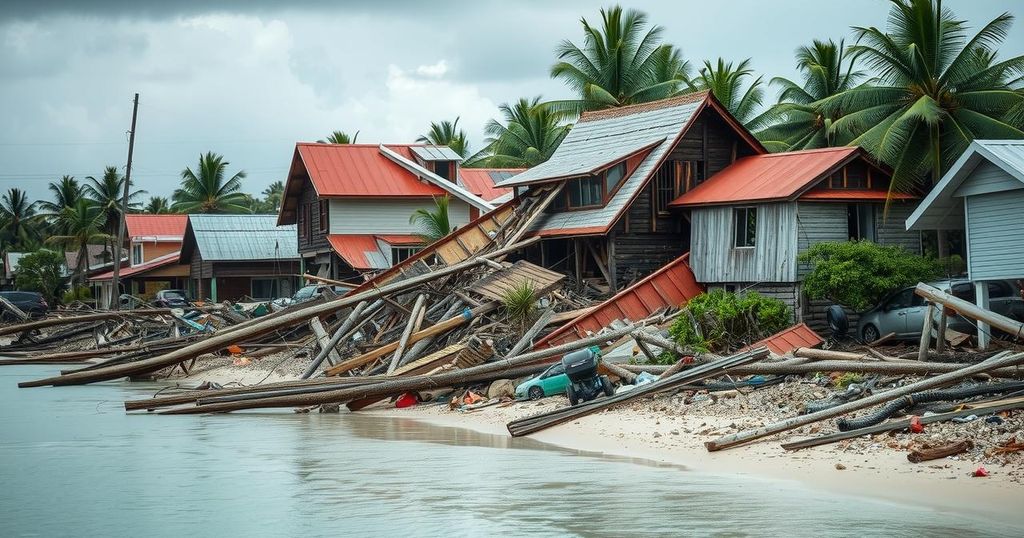Cyclone Chido has caused at least 11 fatalities in Mayotte, with reports indicating severe destruction across the territory. The cyclone’s aftereffects are anticipated to extend to northern Mozambique, where emergency services are on high alert for potential widespread impacts. The French government has mobilized resources and personnel to assist recovery efforts, as previous storms in the region highlight the mounting risks posed by climate change.
At least 11 individuals have tragically lost their lives in the French territory of Mayotte due to the catastrophic impact of Cyclone Chido, according to reports from France’s Interior Ministry. The cyclone, classified as a powerful category 4 storm, made landfall on Mayotte and is currently proceeding towards Africa’s east coast, where further devastation is anticipated, particularly in northern Mozambique.
The Interior Ministry indicated that the ongoing assessment of casualties and injuries has been hampered by the extensive damage across Mayotte. Current reports indicate that nine individuals are in critical condition and a total of 246 others sustain injuries. This cyclone has been recognized as the most severe to strike Mayotte in nearly a century, with Minister Bruno Retailleau expressing concerns that the death toll may rise significantly.
As the damage unfolds, Prime Minister François Bayrou noted the significant destruction of public infrastructure, highlighting that critical facilities such as the main hospital and airport have been severely affected. Many residents, especially those living in vulnerable housing, are at considerable risk due to the cyclone’s destruction.
Cyclone Chido unleashed winds exceeding 220 kilometers per hour (136 mph), wreaking havoc on Mayotte, which is populated by over 300,000 residents dispersed across two primary islands in the Indian Ocean. Reports describe entire neighborhoods being obliterated, with numerous trees uprooted and boats overturned or sunk. In response to the escalating crisis, the French government has dispatched 1,600 police and gendarmerie officers to assist with recovery efforts and to prevent looting in affected areas.
Emergency services have been mobilized, with 110 rescuers and firefighters already present, and an additional 140 personnel scheduled to arrive. Military aircraft and ships are facilitating the rapid delivery of essential supplies to aid those impacted. As the cyclone continues its path, it has reached Mozambique, threatening to affect over 2.5 million individuals across two provinces.
As the region braces for potential further impacts, humanitarian organizations such as the United Nations Children’s Fund have expressed urgent needs for assistance in the wake of structural damage to homes, schools, and healthcare facilities, which may leave communities isolated for extended periods. Previous cyclones in the region have demonstrated the escalating humanitarian crises fueled by climate change, underscoring the urgent plea from vulnerable nations for additional support from wealthier countries.
Cyclone Chido, identified as a category 4 cyclone, has severely impacted Mayotte and now threatens Mozambique as it continues its path across the Indian Ocean. Cyclones have historically posed significant risks to coastal communities in this region, disrupting livelihoods and causing casualties. The current situation is part of a troubling trend where increasing cyclone intensity can be attributed to climate change, impacting the poorest nations that contribute minimally to global emissions. This has raised urgent calls for international support to mitigate the effects of such natural disasters.
The devastation wrought by Cyclone Chido in Mayotte has resulted in the loss of at least 11 lives, with more casualties likely as rescue efforts continue. The cyclone’s impact on public infrastructure and community health raises significant concerns for the safety and recovery of the affected population. As the cyclone moves towards Mozambique, the international community must respond urgently to the increasing humanitarian needs caused by such extreme weather events, which are becoming more frequent due to climate change.
Original Source: www.seattletimes.com






